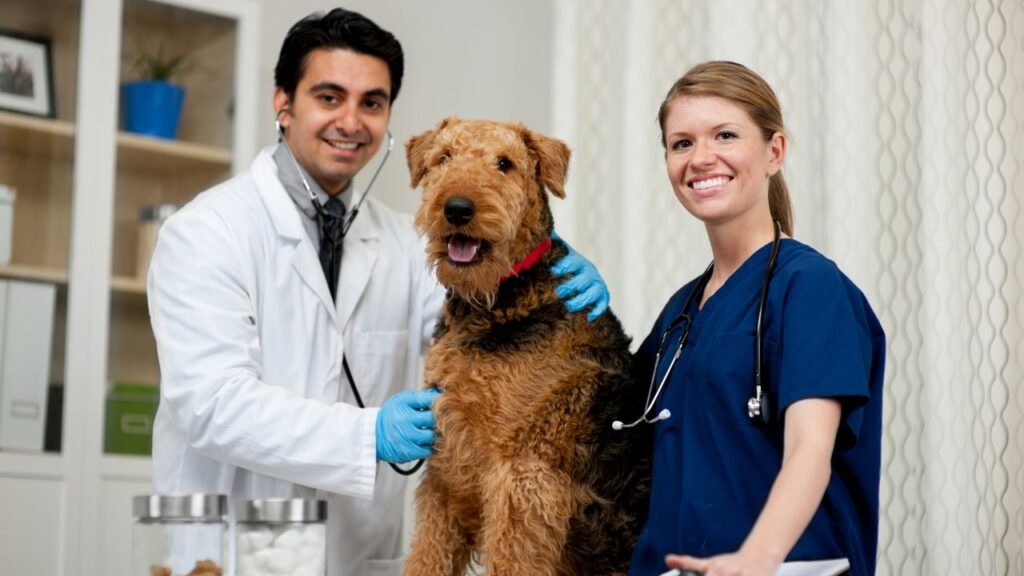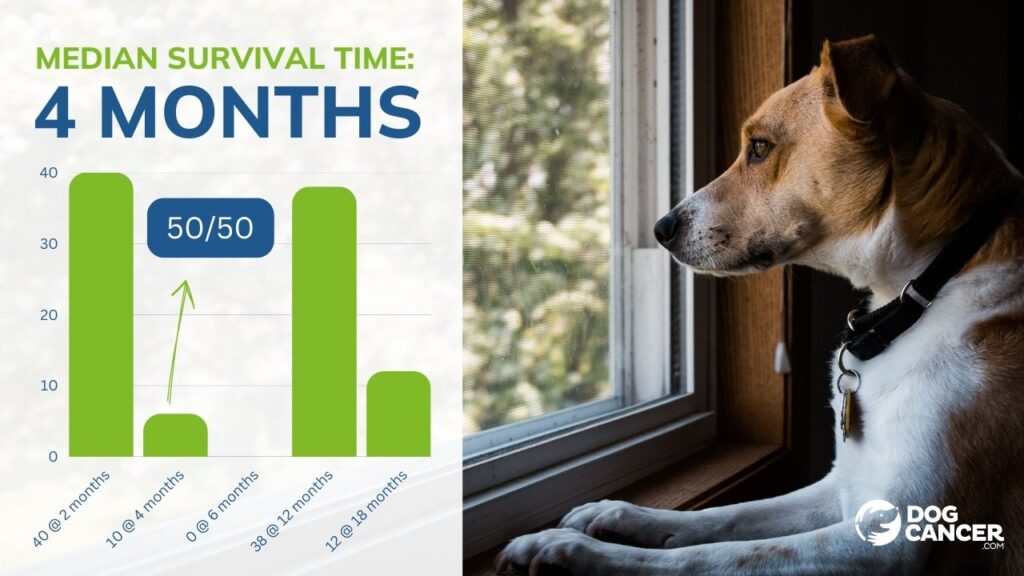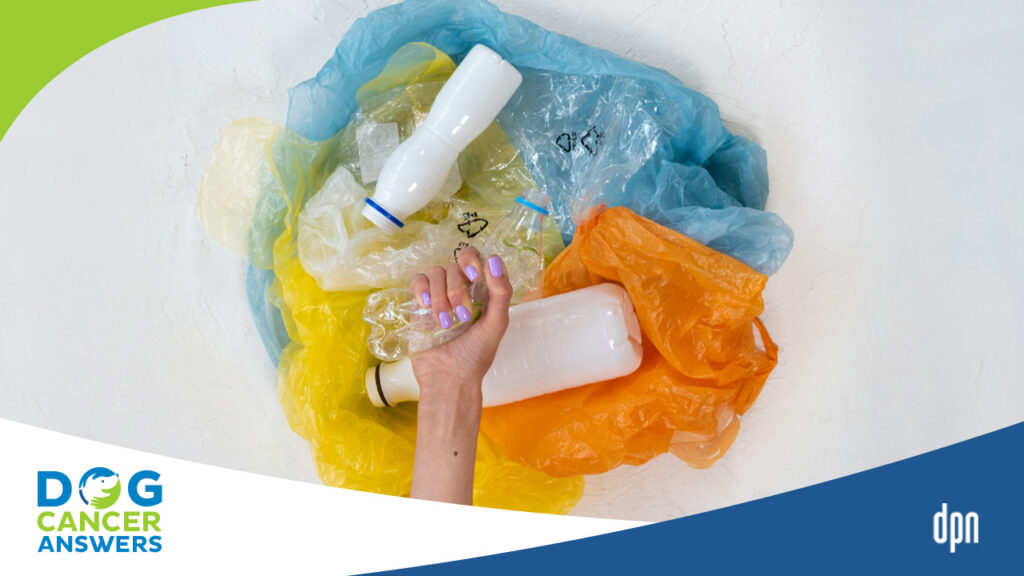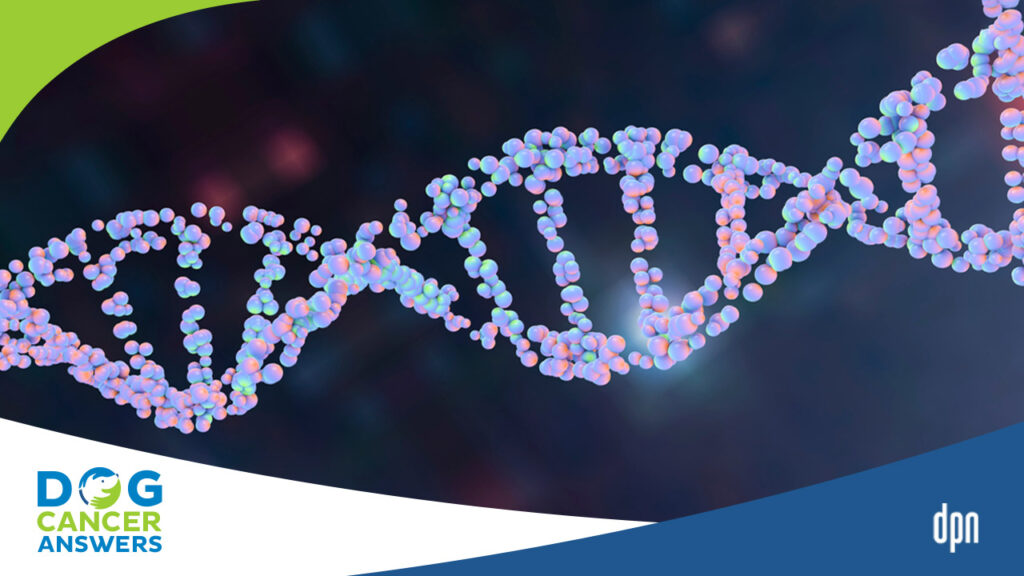EPISODE 229 | RELEASED October 2, 2023
Detox for Dogs with Cancer | Dr. Nicole Sheehan
Dr. Nicole Sheehan is a relentlessly open-minded integrative veterinarian and a liver detox expert.
SHOW NOTES
If Dr. Nicole Sheehan sees a liver working too hard in routine blood work, she moves to a detox protocol as a matter of course, and especially if the dog has cancer. Why? Because an overworked liver struggles to clear the body of toxins. That’s no good for any state of health!
Regardless of whether dogs are overburdened by their environment, a genetic mutation, or both, a liver detox can support the body.
How to do it? Simple milk thistle – a widely available supplement. And: regular bathing.
In today’s wide-ranging discussion Dr. Sheehan explains why and how to detox your dog – and how to know when you might want to start.
Some pesticides are necessary at times: like flea and tick meds. Others, like lawn chemicals, may be less so. And do dogs have a genetic mutation that reduces liver function, similar to the MTHFR genetic mutation found in humans?
In the end, Dr. Nicole Sheehan says, we’ve got to really listen and pay attention to our dogs in order to make good choices.
Links Mentioned in Today’s Show:
Watch Dr. Nicole Sheehan sing on Insta! https://www.instagram.com/nicolethevet/
Dr. Nicole Sheehan’s practice: https://wholepetvets.com/
>> Dr. Nicole Sheehan: I do think cancer is multifactorial, but there is a trigger in the immune system for something. There is a reason and so I try my best to go back to the beginning of when it started or what could have been a trigger and exposure to pesticides or strong chemicals is absolutely on my list of things that I’m looking for.
>> Announcer: Welcome to Dog Cancer Answers, where we help you help your dog with cancer.
>> Molly Jacobson: Hello friend, and thank you for joining us today. Today we’re talking to Dr. Nicole Sheehan, an integrative veterinarian. lives in North Carolina and is totally obsessed with milk thistle and other ways of detoxing a dog’s body to assist their liver in supporting their health.
Dr. Nicole Sheehan, thank you so much for joining us today.
>> Dr. Nicole Sheehan: Thank you for having me. It is an honor to be here with you.
>> Molly Jacobson: Well, it’s an honor to have you here because I saw you on Instagram and it looks like you’ve got a little following as a singer, not just a veterinarian.
>> Dr. Nicole Sheehan: Oh, yes, I, you never know what I’m going to get into. I’m that person who has challenged myself to always say yes to opportunity and I have a very good friend who’s in a band and I’m actually big into meditation and things like that and in a meditation it actually came to me that I was singing on stage with him and I’ve never been a singer and, um.
>> Molly Jacobson: You’ve never been a singer?
>> Dr. Nicole Sheehan: No, I thought it was a metaphor for something and he’s just a believer in that and he said we’re doing it. And so, you know, I find myself on stage singing, thinking, you know, there are people who are so talented and play instruments and sing and have done these things their whole lives and don’t have an opportunity to be in a band and I’m in a band.
So my thing is. You got to say yes. You have to, you know, it’s terrifying. It’s probably the most terrifying thing I’ve ever done because, you know, especially in my career, I’m well known for what I do in my career. And so, you know, people will kind of hold you on this pedestal sometimes. And so I have to warn them, like, when you come to see me sing, don’t think of, of me like that.
>> Molly Jacobson: I would never have known that you weren’t, you know, singing in the high school choir and, you know, starring in the musicals and that you were just getting back to something you loved. I didn’t, no idea that, well, congratulations and.
>> Dr. Nicole Sheehan: Thank you.
>> Molly Jacobson: What an inspiration for our listeners because so many of us are, you know, facing dog cancer. And we’re in that closed down, shut down place. And I actually think it’s the place that you are embracing when you go out on stage and also when you do all of these wonderful things in your own career as a veterinarian, but also an entrepreneur, where you open yourself up and say, yes. Whatever it is that people need to say yes to, that open minded attitude is always going to help, don’t you think, with anything?
>> Dr. Nicole Sheehan: Absolutely, yeah. I mean, I think I have learned so much in this career about being open minded. And the majority of my clients are coming to me because they have been given no hope, no good options.
>> Molly Jacobson: Right.
>> Dr. Nicole Sheehan: And they just want to make sure they’re doing everything they can, which I think is fair. I think that’s all we all want for our pets. And we have this responsibility to do right by them. And I think there’s also something in people’s hearts that just tell them, there has to be more, there has to be something else other than these two awful options. And so what I have learned is, yeah, a lot of times we can do a lot better than those two options.
And so when people come see me, I just really try to get them to open up to the idea that it might be better than they think, that maybe it’s not limited to just black or white, you know, like you do all of these crazy treatments or you do nothing and wait for them to pass. And so yeah, I think that it’s opened up my mind in a lot of ways in life about, and I think that happens to my clients too, right?
They start seeing the world different when, when you can shift something or when someone tells you it can’t be done and you do it and you do it over and over again, you start thinking, well, maybe I won’t listen to everyone who says, this is the way, the only way to do it, or this other thing can’t be done. You never know what can be done. You just have to go for it sometimes.
>> Molly Jacobson: I love it. So I have so many questions for you that don’t have to do with the topic at hand, but you came to discuss detoxing pesticides. So I want to talk about that.
>> Dr. Nicole Sheehan: Yes.
>> Molly Jacobson: And then I want to bring you back for lots of other discussions.
>> Dr. Nicole Sheehan: Okay, great.
>> Molly Jacobson: Yeah. Okay, so a dog has cancer and one of your first thoughts is, let’s just do a liver detox. Am I accurate about that?
>> Dr. Nicole Sheehan: Yeah, so I think for me, the way that I view cancer, the way I view all disease is how did this start? What happened here? And I do think cancer is multifactorial, but there is a trigger in the immune system for something.
There is a reason. And so I try my best to go back to the beginning of when it started or, you know, what could have been a trigger for this disease. And again, that’s for cancer, but it’s for everything. And exposure to pesticides or strong chemicals is absolutely on my list of things that I’m looking for.
>> Molly Jacobson: They can mutate genes.
>> Dr. Nicole Sheehan: Absolutely.
>> Molly Jacobson: And just one gene has to get mutated in order for this cascade to start.
>> Dr. Nicole Sheehan: Yeah. And they, they cause damage to our tissue and free radicals in our system and yeah, they do irreversible damage if you don’t assist the body in, in cleaning that out. So that is something that I am, have become very passionate about.
>> Molly Jacobson: Okay. So let’s talk about that in terms of what a detox actually means from your point of view.
>> Dr. Nicole Sheehan: Yeah. So I think the thing to remember is that our bodies are designed to detoxify. So we have all of these systems in our bodies that are meant to run across unhealthy substances and get them out of the body.
And the problem is, well, I’ll tell you something interesting. I early in my doing integrative medicine, I did a lot of Chinese medicine and I was trying to look and I’m an herbalist in my heart. So I do a lot of herbs and I was trying to find herbs to detox the body because I knew fundamentally some of these dogs needed to be detoxed and none of my Chinese herbs would do it for me.
And I’m like, this is so interesting. But if you think about it, Chinese medicine is ancient. Like they didn’t deal with these chemicals and they weren’t exposed to all of this when they were designing, you know, Chinese herbs and medications and remedies. And so I had to look to a different system to try to detox these dogs.
And so we’re just exposed to a lot of chemicals. We all are, it’s in our air, it’s in our lawns, it’s, kind of everywhere. It’s in the plastics and it’s in our food sometimes. It’s certainly in pet foods. So I think our bodies run across more than they’re intended to. It’s almost like our bodies haven’t been able to keep up with it.
And then there’s a lot of information in people about gene mutations, like MTHFR gene mutations in people where people don’t have a strong ability to detox and I tell you dogs have the same gene. They haven’t found it. I would be so ecstatic if someone, you know, would spend the time to do that.
>> Molly Jacobson: Would find that genetic test to test for MTHFR.
>> Dr. Nicole Sheehan: Yeah.
>> Molly Jacobson: I’m homogenous for that.
>> Dr. Nicole Sheehan: Oh, you know all about it.
>> Molly Jacobson: Yeah, so I am very familiar with how important detoxification is because I, I operate at 30%.
>> Dr. Nicole Sheehan: Absolutely. So I believe very strongly that certain breeds especially are prone to that.
>> Molly Jacobson: That’s interesting.
>> Dr. Nicole Sheehan: I see over and over again, the same breeds needing to be detoxed.
>> Molly Jacobson: Uh huh. What breeds are those?
>> Dr. Nicole Sheehan: Well, they happen to be the same breeds that are prone to cancer.
>> Molly Jacobson: Oh, isn’t that interesting?
>> Dr. Nicole Sheehan: So my number one that I see it in is the buff Golden Retrievers. For me, I see in my practice, the lighter colored ones are more susceptible.
>> Molly Jacobson: Okay.
>> Dr. Nicole Sheehan: I detox a lot of them. In fact, now for their annual checkups, I just put them on detoxing herbs as a preventative as part of their daily maintenance. We can talk about that.
>> Molly Jacobson: Yeah. I want to talk about those herbs when we get to that. Yeah.
>> Dr. Nicole Sheehan: Boxers.
>> Molly Jacobson: Uh huh.
>> Dr. Nicole Sheehan: Pitbulls.
>> Molly Jacobson: Sure.
>> Dr. Nicole Sheehan: Sometimes Poodles, but not quite as much. Westies. I see it in quite a lot, but by far Golden Retrievers, sometimes Labs, but Golden Retrievers are highest on my list, unfortunately.
>> Molly Jacobson: So how do you know a dog needs a detox program?
>> Dr. Nicole Sheehan: Yeah. So it’s interesting the way I really came across it was through skin problems. You know, we have an epidemic of itchy dogs and I was seeing a lot, I see a lot of what I call sixth opinions. They’ve been everywhere. Then they’re like, nothing’s working, but somewhere in their heart, they know somebody’s got to have an answer.
And so I see these things where everyone’s already done all the medicine and they’ve done everything well, but nothing’s working. And what I found and what I find in all the forms of medicine that I practice is I’ve got to figure out what are we missing as a veterinary community because all of my vet colleagues have done everything right.
And I’ve been able to find patterns in these dogs that show an accumulation of chemicals. And a lot of times I will see it on the skin before I see it anywhere else. And so the main thing I’m looking for for that is a graying of the skin.
>> Molly Jacobson: Graying?
>> Dr. Nicole Sheehan: Yeah, so the skin will turn almost a grayish color.
>> Molly Jacobson: Huh.
>> Dr. Nicole Sheehan: And I know that sounds really strange, but now you will never be able to unsee it when you see it in, in dogs. It’s fairly common actually. And the skin turns almost a gray color instead of like a nice peachy pink like ours. Often they’re itchy in unusual areas. So when we think of allergies for dogs, they’ll be itchy on the bottoms of their feet. In this instance they’re itchy in their ankles and their wrists. So they’re kind of itchy in different areas they’ll often chew like here.
>> Molly Jacobson: Uh huh. Right on their wrists not on their.
>> Dr. Nicole Sheehan: Right on their wrists.
>> Molly Jacobson: Not on their paws like, yeah. Huh?
>> Dr. Nicole Sheehan: Mm hmm. And if you look at those areas often they have that grayish color to them.
>> Molly Jacobson: Okay. And you’re talking on the skin or on the fur?
>> Dr. Nicole Sheehan: On the skin.
>> Molly Jacobson: On the skin.
>> Dr. Nicole Sheehan: The skin itself. Yeah.
>> Molly Jacobson: Okay.
>> Dr. Nicole Sheehan: So think about like, their skin should look that peachy pink color like ours. You know, do you ever hear about like, for older people they’ll say they have liver spots on their hands?
>> Molly Jacobson: Yes.
>> Dr. Nicole Sheehan: And those are big freckles. There’s a reason they call those liver spots. So you actually see really large freckles sometimes develop on dogs’ bellies.
>> Molly Jacobson: Uh huh.
>> Dr. Nicole Sheehan: have seen instances where the tumors have actually popped up in those freckled areas.
>> Molly Jacobson: Okay. So you could look at a freckle and think, is it like gray? Like you might be able to see that color change.
>> Dr. Nicole Sheehan: Yeah.
>> Molly Jacobson: Just right there.
>> Dr. Nicole Sheehan: And usually it’s not going to be like one freckle. It’s like last year my dog had pink skin and this year it’s covered in freckles. It’s almost like. black and white, like just covered in freckles. ‘Cause usually it’s going to accumulate in the skin in a large capacity, like everywhere.
>> Molly Jacobson: This is from my knowledge that sometimes if the liver can’t fully detoxify, then the skin is another organ of elimination and it tries to assist, right? It says I can get things to the outside of the body, just send it through all of my pores and I will do it. And that’s when you can get an eczema or acne or other things that may seem like normal skin problems, but could actually be, not always, but sometimes as a sign of underlying liver, working too hard, being overburdened, needing help in the skin, trying to rescue it.
This is what we’re talking about with dogs.
>> Dr. Nicole Sheehan: You are spot on. You are absolutely spot on.
>> Molly Jacobson: Okay.
>> Dr. Nicole Sheehan: And so when the liver is not doing its job properly, and that means it could either be a weakened liver. So what we’re talking about, like maybe a gene mutation or some kind of thing that the animal was born with, or, you know, they either have a, what I call a weak liver, or they have run across a higher than normal amount of chemicals.
And the liver, the healthy liver can’t keep up with what it’s been. You know, what it’s seen. And so the body will start to shoot it out the skin, just trying any way to protect itself, which is really amazing that our bodies are meant to do this.
>> Molly Jacobson: That’s incredible.
>> Dr. Nicole Sheehan: But that is my number one thing I’m looking for.
>> Molly Jacobson: Okay.
>> Dr. Nicole Sheehan: So if I see a cancer patient, I’m looking at their skin actually.
>> Molly Jacobson: No matter what kind of cancer it is.
>> Dr. Nicole Sheehan: No matter what kind of cancer it is. Now, there are two cancers that are more linked that there are actually studies on. There’s extensive information about lymphoma being linked to pesticides in people and dogs.
>> Molly Jacobson: Yes.
>> Dr. Nicole Sheehan: The first time I had ever run across that, I thought this was fascinating. There was a study with dogs who lived on golf courses. And so, you know, they’re spraying like crazy to keep the grass well. My own uncle had lymphoma and he owned a golf course, you know, it’s a thing. And so there’s a lot of research about that.
I have found a small amount of research about mast cell tumors. I have personally found mast cell tumors to be linked to a high burden of chemicals. And so those are my two main ones. Like if I have someone who comes to see me, we have not a lot of cancer within our practice because we have so many preventative strategies for dogs.
But the patients that I’m coming to see from other clinics that are coming with lymphoma and mast cell tumor, the very first thing I do is detox them. That is absolutely on my first order of business to do. And then for any other cancer, I’m looking for signs on the skin or in the liver. Maybe there’s like these mild liver enzyme increases that nobody really knows what to do with.
>> Molly Jacobson: Right. They kind of say, well, it’s, it’s a little elevated, but we won’t worry about it or it’s not a problem because it hasn’t yet gotten to a clinical problem where you’re seeing symptoms associated with that. But you’re saying that gray skin might be a symptom.
>> Dr. Nicole Sheehan: Absolutely.
>> Molly Jacobson: Uh huh.
>> Dr. Nicole Sheehan: And it’s a problem. So if I see any liver elevation whatsoever, I don’t poo poo it. That is already my tip off. Like the body is under distress and it’s not an emergency, but we need to do something about it. And we probably need to have a preventive strategy for that dog moving forward because it’s showing like maybe we just catch it at a time where it has its annual checkup and we happen to catch this elevated liver enzyme, what about the rest of the year?
You know, or maybe we put them on something like Denamarin or milk thistle or something to clear up those liver enzymes and then we take them off. Well, what about the rest of the year? So to me, that’s a big symptom of maybe this dog needs ongoing preventative strategies to help it detox because it’s struggling for whatever reason.
>> Molly Jacobson: Yeah. As a homogenous MTHFR genetic mutation carrier, I can tell you that until I started taking actually for me, what is working for me is a glutathione, liposomal glutathione, that just bypasses all the things that I can’t do well and gives me the thing that is the ultimate end result of all of those is that highly potent antioxidant.
And if I take it and I have all of the cofactors in place, then I feel decently good. And I don’t feel like I’m overburdened, but there were so many things that happened over the course of my life that cleared up once I started taking glutathione every day, whether I, quote, was symptomatic or not. And so that makes sense to me that some dogs would literally just need that extra liver support throughout the year.
>> Dr. Nicole Sheehan: Yeah. And I think that, you know, it’s so beautiful that you understand all of this for your own health, because what I see is an accumulation of chemicals.
>> Molly Jacobson: Yeah.
>> Dr. Nicole Sheehan: So your body can, it’s almost like it’s this machine, right? And you have, I don’t know if you’ve ever looked at the glutathione cycle, probably.
>> Molly Jacobson: Yes. It’s very, very complex.
>> Dr. Nicole Sheehan: It’s very complicated. Like you would have to have a PhD in biochemistry to really understand it. And I have studied it like over and over because I’m obsessed with this, understanding it, but it’s difficult. And the way I think of it is, you know, you’ve always got that machine running. It’s always clearing things out, but we’re always running across things as well.
>> Molly Jacobson: Right.
>> Dr. Nicole Sheehan: And so what I find is that there’s an accumulation process. So when an animal gets to the point where they’ve had a certain accumulation, that’s when you see the problem.
>> Molly Jacobson: Right.
>> Dr. Nicole Sheehan: But it’s an accumulation. So you don’t want anything in the system.
>> Molly Jacobson: Right. Ideally, a liver will, you’ll eat something, you’ll breathe air, you’ll walk through the world, you’ll take a swim and everything that comes into your system, your liver will be able to easily and quickly process, you know, a reasonable length of time, say 24 hours and then you’re ready for the next day.
>> Dr. Nicole Sheehan: Yes.
>> Molly Jacobson: You know, so many people have fatty liver disease. I think they’ve had it for a long time, but we’re just beginning to identify it. That’s a liver that is literally storing things for later. Like, Oh, I can’t deal with this now. We put this over here where I won’t forget to deal with this toxin that needs to be processed.
>> Dr. Nicole Sheehan: Yes, absolutely.
>> Molly Jacobson: So how do we detox a dog? Like what is it that you actually do?
>> Dr. Nicole Sheehan: Well, I think glutathione is fantastic.
>> Molly Jacobson: Can you give glutathione to a dog?
>> Dr. Nicole Sheehan: Absolutely. Yeah.
>> Molly Jacobson: Okay.
>> Dr. Nicole Sheehan: Like you said, you’re bypassing the system. You’re getting to the end result of that detox pathway by doing glutathione. I’ll be honest with you. I don’t use glutathione in dogs because I kind of have my own little detox I do.
>> Molly Jacobson: Sure.
>> Dr. Nicole Sheehan: But glutathione would be really attainable to most pet parents.
>> Molly Jacobson: Wow.
>> Dr. Nicole Sheehan: And that’s easy. So my go to would be milk thistle.
>> Molly Jacobson: Uh huh.
>> Dr. Nicole Sheehan: Also very attainable.
>> Molly Jacobson: Yes.
>> Dr. Nicole Sheehan: Right. And so I would say most dog patients would do about 50 milligrams per 10 pounds.
>> Molly Jacobson: Per 10 pounds.
>> Dr. Nicole Sheehan: A day.
>> Molly Jacobson: Okay.
>> Dr. Nicole Sheehan: You cannot overdo it.
>> Molly Jacobson: Oh, okay.
>> Dr. Nicole Sheehan: So you’re better to do more than less. It is a really safe herb. So if a dog comes in and I need to actually do a detox, I have kind of a, an herbal combination that has six things in it. Um, it’s kind of like a proprietary thing, but you really could do it with high doses of milk thistle. And I think glutathione is, is also a brilliant way to go about it.
>> Molly Jacobson: Wow. I wouldn’t want to try that without finding out from someone like you about the doses and thinking that through, but that is a really of glutathione.
>> Dr. Nicole Sheehan: Yeah.
>> Molly Jacobson: But yeah, that’s really interesting. So, ’cause it’s the same pathways, it’s the same processes.
>> Dr. Nicole Sheehan: Yep. It’s the same.
>> Molly Jacobson: They’re so similar to us, aren’t they?
>> Dr. Nicole Sheehan: They really are. And a lot of what I learn, I learned through human herbalists. And then I try it in dogs and it’s amazing. They really are very similar to us in a lot of ways. And sometimes, yes, I can’t get from my own community how to do this. And so I have to go into the, in the human medicine and try to pull from things that people are doing in human medicine for this.
>> Molly Jacobson: That’s One Health.
>> Dr. Nicole Sheehan: Yeah.
>> Molly Jacobson: Hopefully we’re moving towards that. I have a question about fasting because I know that for me, when I am feeling really toxic, I suppose you could say, like my liver needs a rest. The easiest way for me to get that is to actually just give it more time to work and to kind of get some of that stuff out by not giving it anything more to do by not eating for a while, like 24 hours.
I was thinking about this the other day when I was reading through some of the material that you sent in preparation for this. I wondered if dogs don’t sort of give themselves a little fast when they skip a meal if they’re not feeling well. Do you think that’s possible that they’re sort of like?
>> Dr. Nicole Sheehan: I do, yeah. One of the other things I have learned in the last 10 years of my practice is to listen to them. So the more I do herbal medicine, so I have this thing I do where I have what I call like my tester kit. And so I have little tiny vials of all of my herbs, because if I see a patient who’s really toxic or has several problems, I like to get down to the nitty gritty quickly. And so, and I don’t like to waste my client’s money. I like to pick like the perfect formulas. And here I have 350 herbal formulas, so I’m like really into herbs.
And so I might pick several and say like whatever that animal feels like they need to do first, they’ll choose that herbal formula because it’s natural, so I literally just unscrew the tops and have them sniff it, and they’ll try to eat it out of the bottle. And that’s how I know I have a winner. And so, in doing that, I have figured out, like, they know better than I do.
So sometimes I just get out of the way, and I let them choose. And so, I think you’re exactly right. I have seen where dogs will purposely skip a meal, and I’m okay with it. I’m like, they know something.
>> Molly Jacobson: So you don’t panic.
>> Dr. Nicole Sheehan: No, they know something that we don’t know. They know how to take care of themselves if we just let them. We do, too. We just try to read in books and follow, you know, rules on how to like take care of ourselves, but I also think it’s a lesson for ourselves, you know. We know our own bodies if you just can get in tune with it and listen to it.
>> Molly Jacobson: So another pitch I hear from you for meditation and for being quiet and for opening up that mind and that heart and doing what feels correct. Even if intellectually, maybe I’ve never sung before, but I’m going to go be in a band now.
>> Dr. Nicole Sheehan: Yeah. Yeah. Why not? Right?
>> Molly Jacobson: Right. Right.
>> Dr. Nicole Sheehan: Yeah. Because that’s what my soul is telling me I should do. You know, that’s my next thing. And so, yeah, and I think it’s a beautiful gift to give clients to not stress.
>> Molly Jacobson: Yes.
>> Dr. Nicole Sheehan: It’s like you are doing your dog right by listening to them. We do this for nutrition as well. So I’ll have them choose certain ingredients and see what do they want. Because just like we have cravings for foods, they do as well. And they know what they need to kind of correct themselves, to balance themselves. And they’ll choose, you know.
So, you know, broccoli is one great food for the liver. So I always giggle. Like if I have a dog who’s obsessed with broccoli and like, they’re looking for liver support. So they, they do look for certain foods, they crave them and think about how intense their sense of smell is. Like they can smell everything at such a higher degree than we can. And so they know what they need. I sort of get out of the way and I let them choose for themselves what they think they need to be healthy.
>> Molly Jacobson: So that makes me think about dogs who sometimes go out and eat grass. Do you think that has any relation to this?
>> Dr. Nicole Sheehan: I think some dogs just like to eat grass.
>> Molly Jacobson: Okay. Yeah. Totally.
>> Dr. Nicole Sheehan: You know, sometimes they do, if it makes them throw up, then I kind of worry about that. I always think their nutrition’s not quite right.
>> Molly Jacobson: Uh huh.
>> Dr. Nicole Sheehan: But some dogs I think just like to eat grass.
>> Molly Jacobson: Okay. Good. Yeah. It can be both ends right?
>> Dr. Nicole Sheehan: Yeah. Yep.
>> Molly Jacobson: Right. Right. Okay. So what do you do if you really feel like a dog, like it almost needs an intervention right now. Do you ever do like a crazy intravenous kind of thing or do you rely on supplements mostly take given at home over time?
>> Dr. Nicole Sheehan: For this, mostly supplements. You just have to be patient. So my most toxic dogs require 12 weeks of a detox. So my standard detox is 6 weeks long. But dogs that have been symptomatic for years they will take 12 weeks to detox.
>> Molly Jacobson: What do they look like? How do they behave? What changes do you see as they detox and how do you know when they’re done, when they’re better?
>> Dr. Nicole Sheehan: Yeah. So, you know, again, I’m looking at the skin a lot. So a lot of them are itchy and they have these changes in their skin and you’ll actually see the color, the gray color come out of their skin.
So you actually see the color restore to their skin. It’s really interesting. And, you know, anyone can see that and they’re dogs so they can see that what’s really interesting is a lot of times I’m detoxing them because they’re itchy and all the allergy treatments aren’t working and I’m like, well, it’s because it’s not an allergy, or maybe it’s an allergy to the chemical.
It’s not an allergy to pollen. And what’s really interesting about it is they don’t feel better until every bit is out of their system. And so it will be a very small proportion of dogs that feel better immediately where people say oh my gosh. If they just like a fog was lifted, very small proportion, maybe 10 percent of the dogs that I detox.
Most of them, you just got to stick with the program and you just got to plug away. There might be a faster, more aggressive way to go about it. But I just haven’t had the need to do it ever, you know, and sometimes I think aggressive is not always better.
>> Molly Jacobson: Right.
>> Dr. Nicole Sheehan: So supporting the body, like doing it this way is so supportive. So you’re supporting the body as it’s going through this struggle. I’ve just had such great success with that. I haven’t needed to be more aggressive. It’s more of being patient. And it’s funny because I have now several vets that work for me that I teach this method to. And then sometimes they’ll be like, Oh, it’s not getting better.
So go see Dr. Sheehan and see what she has. I’m like, no, you were doing the right thing. You just had to keep going. You just didn’t have the confidence to just stick with it. Stick with it. You’re doing so like the other doctors, they’re, they’re making all the right choices. They were right on. It’s just that after it’s been going on a while, you think, gosh, did I do or did I miss something? And you just have to plug away at it. You just got to get the body back to a good state of health.
>> Molly Jacobson: Okay, so when you say this method, and you mentioned that you have six herbs that you like to use in a little proprietary formula, is there anything else other than the supplements that you’re doing with the dogs?
>> Dr. Nicole Sheehan: No.
>> Molly Jacobson: Okay.
>> Dr. Nicole Sheehan: Although I will say, naturally, we’re very big on nutrition here.
>> Molly Jacobson: Uh huh.
>> Dr. Nicole Sheehan: Very big. So we’re big believers in trying to do. processed foods.
>> Molly Jacobson: Uh huh.
>> Dr. Nicole Sheehan: So as little kibble as possible. So that’s, that’s a standard for us as well. And so I can’t, it’s not a specific thing I do. I don’t do a specific diet or anything to support the liver. I would say for any pet that’s under distress, well, it’s either in a, just a preventative state where people want to take really good care of them and prevent cancer, or they’re in a disease state that they’re trying to heal, we’ll always improve their nutrition. That’s paramount for everything that we do.
>> Molly Jacobson: Sure. Well, yeah. I mean, when you’re eating good food, then you are by definition, not adding insult to injury, right?
>> Dr. Nicole Sheehan: Exactly.
>> Molly Jacobson: Yeah. Like there’s no need to make things worse.
>> Dr. Nicole Sheehan: Yeah. That’s kind of an obvious thing. I didn’t really say, but I should say is, yeah. Identify where are the chemicals coming from? Like, is this a patient who we think has a weak liver or is this a patient who’s had a higher than normal amount of chemicals? So educating the owner on things.
I’ll tell you what, I learned something when I was studying essential oils for pets. I don’t use them a lot because I’m such an herbalist, but there are times when I use essential oils. But I thought it was really interesting when I was doing training for it. How, when you’re using essential oils for pets, you can just rub it on their fur.
And it’ll wick down the fur, so you don’t even have to put essential oils on their skin. It’ll wick down their fur and get into their body through that. And I had this light bulb moment where I thought, that’s how the chemicals are getting into their system.
>> Molly Jacobson: That’s how it happens.
>> Dr. Nicole Sheehan: Yeah, I mean, so I have a pit bull mix who his skin turns gray and it’s cute even my kids will be like, mom, he needs a detox because his skin is turning gray and they can see it. And he’ll start like chewing on his ankles. He really doesn’t have any health problems, but I don’t want him to. And as a pit bull, he is going to be prone to mast cells, mast cell tumors. And so my preventative.
>> Molly Jacobson: Which are an immune system cancer.
>> Dr. Nicole Sheehan: Yeah, absolutely. So I think the immune system cancers are more susceptible to pesticides. So we, we have him on a regular detox. He’s on a full detox right now. And of course, because everyone sprays their lawns in, you know, April and May. So now it’s the end of June and he needs a detox. And so what’s interesting is, We don’t spray at all at our house.
He and I run in the woods. They’re not spraying in the woods where we are on the trail. We walk on the pavement like he’s not even in anyone’s yard and I don’t spray and yet he still needs a detox.
>> Molly Jacobson: Yeah.
>> Dr. Nicole Sheehan: So I think he, you know, again is this breed who needs more detoxing, but it also is, you know, If you’re on a hill and your neighbor sprays, when it rains, all of that trickles down, goes down the hill, and then it grows up in your grass.
>> Molly Jacobson: That’s right.
>> Dr. Nicole Sheehan: So we can’t control for what everyone else is doing. And then the way that I think about it is, you know, most of our pets, like our dogs, they don’t need regular bathing. Some dogs do because it’s sitting on their fur and it’s just wicking through the fur and getting into their bodies that way.
>> Molly Jacobson: That’s really interesting. So my bath.
>> Dr. Nicole Sheehan: Yeah, a weekly bath.
>> Molly Jacobson: As a detox.
>> Dr. Nicole Sheehan: Yeah.
>> Molly Jacobson: Okay.
>> Dr. Nicole Sheehan: Or washing their feet or wiping their feet down after they’ve been in grass or you know the two times a year here where people spray often would be April and October and you will see. And before I knew this about detoxing you think it’s allergies because those are also the pollen seasons for us here. So now I’ve been able to tell the difference based on where they’re itchy and what their skin looks like, whether it’s pollen or it’s chemical.
>> Molly Jacobson: Okay. So let’s just explain that right now. When it’s a pollen allergy, you see what, and when it’s a liver overburden, you see?
>> Dr. Nicole Sheehan: So pollen is usually the bottoms of the feet or the toes or underneath the feet where the pollen is. It’s usually red and irritated and itchy. Sometimes ear infections and things like that. The dogs that have an overburden of chemicals are more itchy on their ankles and their wrists and also in their flanks, which the flank is kind of like this area, you know, it’s just a random on their flank.
>> Molly Jacobson: Yeah.
>> Dr. Nicole Sheehan: And so that absolutely is the pattern and then a graying color to the skin. or less frequently, lots and lots of freckles. But usually you’re going to have more of a light gray color coming through on the skin.
>> Molly Jacobson: That’s fascinating. This is a good spot to take a break and listen to our sponsors. And then we’ll be back in a minute with Dr. Nicole Sheehan.
And we’re back with Dr. Nicole Sheehan. So what are your suggestions for actually avoiding all of these toxic exposures?
>> Dr. Nicole Sheehan: Yeah. So think twice about treating your yards. Think about what is more important to you, the grass or your, you know, your pet’s health. Um, you’ve got to make a decision about the chemicals that you’re directly exposing your pets to during those seasons where, you know, and I had, like I had someone yesterday who said my husband loves his grass.
Okay. Well, she just knows this. So what I have learned over the years is I don’t tell anyone to do anything they don’t want to do. It’s pointless.
>> Molly Jacobson: Right. It doesn’t work.
>> Dr. Nicole Sheehan: It doesn’t work. It never does. So I don’t judge her. You know, make her feel bad.
>> Molly Jacobson: Right.
>> Dr. Nicole Sheehan: I’m certainly not gonna make her husband feel bad. This is her reality. So what I have to do is I have to support this dog. And so she knows this. And so I just tell her, and she’s a great client. Okay, well, we’re going to do regular detox on your dog, and she’s fine with it. You know, she loves it. And so you’ve got to make, you know, choices one way or the other.
And so that’s one thing is just being careful about what’s being sprayed. Inside the home, I don’t tend to see a problem with like cleaning sprays and things like that. That does not seem to be an issue. Where I see an issue is when people have redone their flooring.
>> Molly Jacobson: Ah.
>> Dr. Nicole Sheehan: That’s a trigger.
>> Molly Jacobson: Yeah.
>> Dr. Nicole Sheehan: There’s lots of chemicals in flooring for some reason.
>> Molly Jacobson: And that can be carpet or laminate or any kind of, any kind of surface is going to have those chemicals, really.
>> Dr. Nicole Sheehan: Yes. So for some reason, if you have been in a situation where you’ve just redone your flooring and your animals are itchy, that’s a thing. So I might detox them.
>> Molly Jacobson: They’re spending a lot of time on it.
>> Dr. Nicole Sheehan: Yeah, absolutely. And they’re right down in it, right? More so than we are.
>> Molly Jacobson: For sure.
>> Dr. Nicole Sheehan: Also, the other way we see it is with flea and tick prevention. So many of the substances that work as flea and tick preventatives for dogs will also do this if they are sensitive to it.
>> Molly Jacobson: Because they are pesticides in the end.
>> Dr. Nicole Sheehan: They’re pesticides. Yeah.
>> Molly Jacobson: Right.
>> Dr. Nicole Sheehan: So here we kind of practice safe use of. those. Because fleas and ticks are no joke either, especially ticks. I see a lot of hidden tick illness in my second opinion. So it’s also equally destructive, the things that they pass on so you’ve got to be smart about it. And the biggest symptom we see for pets that are sensitive is that they’ll get itchy after they take that.
So let’s take a flea and tick preventative and then they’ll be itchy for several days after. And they’ll be itchy in those spots that I’m talking about. And so those are the dogs where we think it’s not great for them to have that, depending on how sensitive they are, we might have to pull those out of their regimen and find other ways to try to prevent those things.
And so that’s another big, big area. And it’s funny because we were noticing it with the flea and tick preventatives. And now it’s actually on the label that may cause itchiness. It don’t say may cause liver problems, but like may cause itchiness, itchy skin. But that’s really why, because it’s technically a pesticide. So.
>> Molly Jacobson: So would you tend to use those, but then do a detox to help the dog shed it more often or quicker?
>> Dr. Nicole Sheehan: Sure. Yeah, absolutely. So if it’s a patient who really needs to stay on that, then they may also stay on milk thistle year round.
>> Molly Jacobson: All right. So it’s not about saying, because you’re not anti conventional treatments. You’re just like recognizing the reality of what they can bring to the table.
>> Dr. Nicole Sheehan: Yes. Thank you. That’s exactly right. So I think because I’m a holistic vet, people think that I’m really anti those things. Well, you know, what I say is the magic is in the middle. Like if we do nothing, we’re going to have problems that way. And if we do too much or we’re not conscious of what can happen when you do too much, we’re also going to cause trouble.
So how do we find that middle zone where we’re protecting them, but we’re also being conscious about it or being aware of what else we might have to do, you know, to take really excellent care of them.
>> Molly Jacobson: Yeah. If people could only do one thing, they stop listening to this episode, what’s the one thing they could do today that would help their dogs detox if they think that’s a necessary thing?
>> Dr. Nicole Sheehan: Go to the health food store and pick up milk thistle, give it every day.
>> Molly Jacobson: Okay.
>> Dr. Nicole Sheehan: It’s really that impactful.
>> Molly Jacobson: Okay. And that’s 50 milligrams per 10 pounds of body weight.
>> Dr. Nicole Sheehan: Yep. Daily. You could do it all at one time. You can split it. They can be off of it. So the way, again, you’re thinking about it is an accumulation process. So what I tell people is like, if you’re going to travel for the weekend, you don’t have to take it with you. Like.
>> Molly Jacobson: Okay.
>> Dr. Nicole Sheehan: It’s not like aspirin where you take it and it works for 12 hours. Right? It should be just a daily part of their regimen to constantly be detoxing them so they can go without it or if you ran out of it, don’t run to the health food store tomorrow, right?
>> Molly Jacobson: Okay.
>> Dr. Nicole Sheehan: You could go next week and it’ll be fine. But the more they’re on it, the more they’re going to stay. clean, you know, in their bodies.
>> Molly Jacobson: So make it a part of their daily regimen. And it’s like, uh, any other thing that’s going on, it’s not an emergency. You don’t think of it as like their liver is going to die if I don’t give them the milk thistle. It’s just an extra support.
>> Dr. Nicole Sheehan: Exactly.
>> Molly Jacobson: For that liver.
>> Dr. Nicole Sheehan: So I take it every day and one of my dogs does, who’s really sensitive. The two of us take it every day. Because I also have trouble with that.
>> Molly Jacobson: Okay. Isn’t it interesting how we so often, like, get really knowledgeable about the things we have trouble with ourselves?
>> Dr. Nicole Sheehan: Absolutely, or our pets. You know, we learn so much. I’ve learned so much from my own pets because you just know them so well. And for me, I’m free to kind of experiment on my own animals, you know, in safe ways. When we’re using herbs, it’s so safe, but then I don’t, you know, I feel like that’s a good way for me to try things and then learn from my patients.
>> Molly Jacobson: Right. You can fully consent and you understand all of the things and you don’t have to educate.
>> Dr. Nicole Sheehan: Exactly.
>> Molly Jacobson: So what’s your favorite cancer treatment story about detox or any other? What’s your favorite story about cancer treatment?
>> Dr. Nicole Sheehan: So one of my favorites was a dog named Gump, and.
>> Molly Jacobson: Oh, Gump?
>> Dr. Nicole Sheehan: It was a chocolate lab.
>> Molly Jacobson: Oh yes.
>> Dr. Nicole Sheehan: And I first met him maybe six years ago, about four years into owning my own integrative practice so I was really free to just do all the things that I thought were. beneficial. And this really sweet couple came in and the dog had a bleeding tumor of the spleen and was recommended for surgery. And he came in on a stretcher and they said, you know, we don’t think he’s going to make it through surgery, but if you could give us one more weekend with him, we would be so grateful.
And they were so grounded and beautiful and, and they were hopeful that I could just give him a little bit more time. And we did, and we kept giving him time, you know, so within a few days he was walking again. And.
>> Molly Jacobson: Did he have the surgery?
>> Dr. Nicole Sheehan: No, never had the surgery.
>> Molly Jacobson: Oh, he didn’t have the surgery. What?
>> Dr. Nicole Sheehan: Never had the surgery. Went to.
>> Molly Jacobson: I’ve never heard this story before.
>> Dr. Nicole Sheehan: His liver. So we have several of these patients and went, you know, on to his liver and all these things. But this dog lived three years.
>> Molly Jacobson: Wow.
>> Dr. Nicole Sheehan: He would come in and like hurt his leg playing, you know, and we would just laugh. We’re like, Gump basically hurt his knee because he was out playing ball.
>> Molly Jacobson: With his cancer in his spleen and his liver.
>> Dr. Nicole Sheehan: Yeah. And so he was really memorable to me because that was probably the first time that it had ever happened. And it’s one of the instances in which I learned, it’s not always the end. It’s not.
>> Molly Jacobson: Right.
>> Dr. Nicole Sheehan: And one of the other things I’ve learned since then is that when I have a client who comes in and they can’t stop crying, I have come to the point where I’m so honest because what they’re there for is my advice because they’ll say I, you know, they said that my dog only has three months to live and they just can’t stop crying about it. And it’s like, I know in their mind, They have this number stuck in their head.
>> Molly Jacobson: That’s right.
>> Dr. Nicole Sheehan: And I just tell them, if you can’t stop thinking about that, and you have all this energy going to it, with the tears and the sadness and the, the loss of hope, I promise you, your pet will be gone in three months. And what I’ve noticed over the years, the people, like Gump’s people who come in and they’re like, if you could get me one last trip to the beach, I’d be so grateful.
Anything you can get us, we know is a blessing. And they come at it with just, uh, we’ll take what we can get. And they’re hopeful. And those animals live longer and it is profound how much our energy goes into the healing process. So I see people who, you know, let’s say they did an amputation because there was cancer there.
Then I just say, okay, the cancer is gone. Just, you’ve got to think about it. It’s gone. Now what we’re doing is we’re just preventing it in the rest of the body. You’ve got to just think of it different.
>> Molly Jacobson: I love that.
>> Dr. Nicole Sheehan: And the way that they put their thoughts onto their dog literally makes a difference for their survival times. It’s fascinating.
>> Molly Jacobson: I’ve been involved with helping people whose dogs have cancer since 2007 as a layperson and a science writer and, uh, editing Dr. Dressler’s book. I’ve spoken to hundreds of thousands of people over the years, and that is the number one takeaway that I have from this whole experience.
From the beginning, the reason he even wanted to write the book was because he said people don’t get it, that they do have options, but they need to rein in all of the fear, and we need to manage that so that we can pay attention to what’s actually going on and make choices. And people who do that have tremendous outcomes, even if it’s a short time to the human brain.
>> Dr. Nicole Sheehan: Yes.
>> Molly Jacobson: The quality of time is so wonderful. It’s not filled with fear and sadness, but there’s so many stories I have of dogs that have lived years past their prognosis.
>> Dr. Nicole Sheehan: Yeah. Yeah. And it’s so impactful and all the medicine is great, but it’s like, there’s so much more that people have power over that they don’t realize, right?
>> Molly Jacobson: They don’t realize and they can focus on their dog and get there.
>> Dr. Nicole Sheehan: Yeah. I have another really impactful story I wanted to share with you that I think is like the other huge thing that I’ve learned. And this was not successful in terms of the cancer, but it taught me so much. And this goes back to listening to the animals.
So I had this dog who came to me for sixth opinion and had lymphoma and was going to the oncologist, had already gone through the main lymphoma protocol. It stopped working. They went to the rescue protocol. It stopped working. They went to the last option. And it stopped working. So this dog has already been through every drug on the planet by the best doctors you could have, right?
>> Molly Jacobson: Right.
>> Dr. Nicole Sheehan: And so they’re coming to me just wondering if I could do something. So lymphoma is one of my difficult ones. If I catch lymphoma super early, sometimes I can reverse it. I have to catch it really early. It’s a hard one. And so it’s the one I’ve struggled with probably the most doing naturally. And so I just was honest with these people.
I said, you know, your dog is already resistant to so many things. Like I literally cannot tell you that I’m going to be able to really make a difference here. But what’s crazy is this dog was terrified. It was one of those dogs who’s afraid of people in general, super introvert dog. And she spent her time on the other side of the room just looking at me.
Like an old soul of a dog, right? She’s watching me and watching me and I didn’t come in her space because I didn’t need to and we’re doing a lot of talking and I had just hit up my human herbalist friends where I said, you know, I’m missing something with my lymphoma protocols. I’m missing something.
And I don’t know what it is. So when you think of lymphoma, what do you think of? And they tipped me off to something I might be missing. And it was funny. So I said to these people, I’m not going to make you feel like I can reverse this, but they wanted to do everything. So I said, I’ll give her my lymphoma protocol.
And I shared with them, I said, I think I’ve been missing something that I want to try on your dog. It won’t hurt her. It’s all herbal, whatever, but I want to try this. And it was really interesting. So I had the stack of herbs that’s my typical lymphoma protocol. I had it sitting there and then I brought this other one over, my assistant brought it in, and she handed it to me. And the dog moved across the room and sat on my foot.
>> Molly Jacobson: The dog was like, bingo, that’s what I need.
>> Dr. Nicole Sheehan: Yes. I mean.
>> Molly Jacobson: Oh my gosh.
>> Dr. Nicole Sheehan: Yes. And I looked at my assistant and she said, Did that just happen? And I said, yeah. And that is now my protocol where I have actually been able to be more impactful. But that dog didn’t want nothing to do with me. Heard every word I was saying, somehow understood this, came and sat on my foot and looked up at me.
So we have to listen to them. They know so much. We have to listen to them.
>> Molly Jacobson: Don’t you think they understand us, even if they don’t speak English?
>> Dr. Nicole Sheehan: Absolutely. Well, how does she, she, she felt me. She was looking at me. She’s watching me the whole time. They understand things that we, we just can’t even fathom. And so, you know, again, it’s a way to take the fear out of the process, right? We know more than we think. They know more than we think, so do the best you can. You know, that’s what we’re here for.
>> Molly Jacobson: Let your dogs be the guide. Yeah. Oh, this has been so wonderful to talk to you. Thank you.
>> Dr. Nicole Sheehan: You’re welcome. Thank you.
>> Molly Jacobson: And thank you, listener. I don’t think there’s much for me to say to wrap up this show. Dr. Nicole obviously has a very deep passion for dogs and uses her intuition and her deep listening skills to let the dogs in her practice guide her, and I think that might just be a cue for all of us dog lovers to go ahead and follow suit.
I’m going to take my little dog, Chloe, for a walk and listen deeply to her and see how the day goes. And in the meantime, I hope you’ll join us on the socials. Sign up for Dog Cancer News at DogCancerNews.com. And of course, visit us on DogCancer.com for this and many other podcast episodes, articles, and many other resources from our whole team of veterinarians and science writers and science communicators who are here for you with your dog with cancer.
From all of us here at Dog Podcast Network, I’m Molly Jacobson wishing you and your dog a warm aloha.
>> Announcer: Thank you for listening to Dog Cancer Answers. If you’d like to connect, please visit our website at DogCancer.com or call our listener line at (808) 868-3200. And here’s a friendly reminder that you probably already know, this podcast is provided for informational and educational purposes only. It’s not meant to take the place of the advice you receive from your dog’s veterinarian.
Only veterinarians who examine your dog can give you veterinary advice or diagnose your dog’s medical condition. Your reliance on the information you hear on this podcast is solely at your own risk. If your dog has a specific health problem, contact your veterinarian. Also, please keep in mind that veterinary information can change rapidly, therefore, some information may be out of date.
Dog Cancer Answers is a presentation of Maui Media in association with Dog Podcast Network.
Hosted By
SUBSCRIBE ON YOUR FAVORITE PLATFORM
Topics
Editor's Picks
CATEGORY











